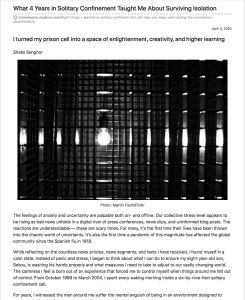Join getAbstract to access the summary!

Join getAbstract to access the summary!
Shaka Senghor
What 4 Years in Solitary Confinement Taught Me About Surviving Isolation
I turned my prison cell into a space of enlightenment, creativity, and higher learning
Medium, 2020
What's inside?
If Shaka Senghor can turn solitary confinement into a place of enlightenment, you can make the most of being home.
Recommendation
In October 1999, Shaka Senghor was thrust into a dreadful new reality – a six-foot by nine-foot cell. Not knowing when he’d be allowed to leave the confined space, he underwent a period of anger and resentment – but then he set to work expanding his soul and transforming himself so his punishing environment became a place of light and learning. People have compared COVID-19 shelter-in-place orders to being in prison. It’s easy to imagine why such a comparison might rankle someone who has actually experienced the most abusive form of prison life; but, with characteristic empathy, Senghor shares his hard-won tips for how to thrive – and grow – in very limiting circumstances.
Take-Aways
- Recognize that only two things are under your control: your thoughts and your actions.
- Meditate to reduce anxiety, write to harness your thoughts.
- Make your ideal future visible with a vision board, then take steps to make it a reality.
- Study a new subject, experiment with cooking or learn a useful craft.
- Improve your body as well as your mind. Exercise every day.
Summary
Recognize that only two things are under your control: your thoughts and your actions.
Shaka Senghor spent four years in “an environment designed to crush souls,” otherwise known as solitary confinement. His first two years were full of anguish, primarily due to uncertainty. He didn’t know when he’d be allowed to leave. Each time someone came near his cell, he wondered whether the torture was coming to an end, only to despair when the footsteps passed his door. Tension wreaked havoc on his mental health. He was at the mercy of prison administrators who seemed indifferent to his suffering. Somewhere in the midst of year three, Senghor discovered a tool that kept him sane: writing.
Writing led Senghor to the transformative realization that his thoughts and his actions were the only two things he could control. He didn’t have power over his external circumstances, but he could work to become the kind of man who would one day emerge from solitary confinement “healthy and whole.”
“I stopped worrying about when the prison administration was going to release me and focused my energy on becoming the best version of myself.”
Shelter-in-place orders aren’t a prison, but they are confining, and a healthy understanding of what you can and can’t control will help you adjust. You may fear for the health of your family members, you may be caring for children who are out of school and your financial future may look grim – whether one or all of these things are true for you, the pandemic could be plunging you into uncertainty. Meditating, writing, and learning can give you a reprieve from uncertainty and fretfulness.
Meditate to reduce anxiety, write to harness your thoughts.
Worries so often take the form of ceaseless, anxiety-stricken voices in your head. During his time in solitary confinement, Senghor discovered that meditation is a valuable tool for quieting those voices. Meditation can be as simple as breathing in for five seconds, imagining the release of troubling thoughts, then breathing out for five seconds, then breathing in positivity.
“Give yourself permission to let go of the things you can’t control while embracing the empowering energy of being in control of how you think and feel.”
Writing is healing, as well, whether you write a letter, a book or a journal entry. Write letters to maintain your connections with your friends and family. Write letters to your past and future self to process your feelings, with the added benefit that you will be able to read these letters in the future to see if your reality lines up with your previous hopes and dreams. The pandemic may be providing a break from your normal routines, giving you a chance to write something longer, like a book or a story. You could commit to writing a page, paragraph or sentence each day.
“The greatest gift I gave to myself while in solitary confinement was the gift of journaling. I poured my heart and soul into my notepads.”
Even if you don’t want anyone else to read your writing, consider journaling. Senghal compares it to “meditation on paper,” a way to “see yourself clearly” and process and liberate yourself from past traumas.
Make your ideal future visible with a vision board, then take steps to make it a reality.
While in solitary confinement, Senghor paced the floor, imagining the smallest details of his ideal life. When he got access to magazines, he cut out images that fit his vision and pasted them to a vision board. He also wrote out his goals, among them “write a New York Times best seller,” and “be interviewed by Oprah.” He’s since accomplished those and many other goals that date back to his days in prison.
“What does the world look like for you on the other side of this pandemic? Who do you want to become? What do you want to accomplish?”
Turbulent times can launch you into your ideal future. Consider creating a vision board, then take action to bring your vision into reality.
Study a new subject, experiment with cooking or learn a useful craft.
Prisoners innovate with limited materials. They brew wine by fermenting fruit juice, make incense with deodorant and toilet paper, and unravel their socks to create “fishing lines” for passing notes to fellow inmates. Senghor likens the acts of genius he witnessed behind bars to the innovation he sees today as a fellow at the MIT Media Lab.
“Take this time to learn something new and useful.”
Make this unexpected time at home into a learning opportunity. “Knit, sew, draw or make prison wine.” Take advantage of the instructional videos and free college courses online. If you enjoy cooking, let the limitations imposed by fewer visits to the grocery store inspire new recipes.
Improve your body as well as your mind. Exercise every day.
People often leave prison in great physical shape, which may lead you to believe that there’s not much to do behind bars but exercise. Senghor suggests another motive: exercise is a necessary stress reducer when you’re trying to survive the vicissitudes of prison life.
“In the middle of every crisis, there are opportunities to make ourselves better in the long run.”
While in prison, Senghor created ingenious improvised exercise equipment from his mattress, sheets and books. Your gym may be closed, but you still have ample opportunity to get in shape or stay fit. Make your quarantine buddy into your work out buddy, and your relationship is likely to benefit along with your health.
About the Author
Shaka Senghor is the author of Writing My Wrongs: Life, Death and Redemption in an American Prison. He’s a director’s fellow at the MIT Media Lab, and he teaches classes for the Atonement Project.
This document is restricted to personal use only.



















Comment on this summary